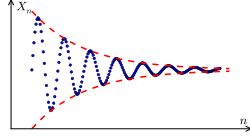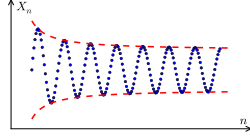Cauchy's convergence test
코시 수렴 테스트(Cauchy convergence test)는 수렴(convergence)에 대해 무한 급수(infinite series)를 테스트하기 위해 사용되는 방법입니다. 그것은 급수에서 항의 경계하는 합에 의존합니다. 이 수렴 기준은 오귀스탱-루이 코시(Augustin-Louis Cauchy)의 이름을 따서 지어졌으며 그는 1821년 그의 교과서 Cours d'Analyse에서 그것을 출판했습니다.[1]
Statement
다음 급수가
수렴하는 것과 모든 각 에 대해 다음이
모든 n > N과 모든 p ≥ 1에 대해 유지됨을 만족하는 자연수(natural number) N이 있는 것은 필요충분 조건입니다.[2]
Explanation
그 테스트는 동작하는데 왜냐하면 (절댓값에 의해 제공된 메트릭을 갖는) 실수의 공간 과 복소수의 공간 는 둘 다 완비(complete)이기 때문입니다. 여기서부터, 그 급수가 수렴(convergent)하는 것과 다음 부분 합이 코시 수열(Cauchy sequence)인 것은 필요충분(iff) 조건입니다:
- .
코시의 수렴 테스트는 모든 코시 수열이 수렴하는 공간인 (과 와 같은) 완비 메트릭 공간(complete metric space)에서 오직 사용될 수 있습니다. 이것은 우리가 그것의 원소가 급수가 수렴함을 증명하기 위해 수열에서 유한 진행 후에 서로 임의적으로 가까워지게 되는 것을 보여주기만 하면 되기 때문입니다.
Proof
우리는 무한 급수의 부분 합의 수열의 수렴에 대한 결과를 사용하고 그것을 무한 급수 자체의 수렴에 적용할 수 있습니다. 코시 기준 테스트는 그러한 응용 중 하나입니다. 임의의 실수 수열 에 대해, 수렴에 대한 위의 결과는 다음 무한 급수(infinite series)가
수렴하는 것과 모든 각 에 대해, m ≥ n ≥ N가 다음을 의미함을 만족하는
- [3]: 188
숫자 N이 있음이 필요충분(iff) 조건임을 의미합니다.
아마도 [이 정리]의 가장 흥미로운 부분은 코시 조건이 극한의 존재를 암시한다는 것입니다: 이것은 실제로 실수 직선의 완비성과 관련이 있습니다. 코시 기준은 다양한 상황으로 일반화될 수 있으며, 이것은 모두 "사라지는 진동 조건이 수렴과 동등함"으로 느슨하게 요약될 수 있습니다.[4]
This article incorporates material from Cauchy criterion for convergence on PlanetMath, which is licensed under the Creative Commons Attribution/Share-Alike License.
References
- ^ Allegranza, Mauro. "Answer to 'Origin of Cauchy convergence test'". History of Science and Mathematics. StackExchange. Retrieved 10 September 2021.
- ^ Abbott, Stephen (2001). Understanding analysis. Undergraduate Texts in Mathematics. New York, NY: Springer Verlag. p. 63. ISBN 978-0-387-21506-8.
- ^ Wade, William (2010). An Introduction to Analysis. Upper Saddle River, NJ: Prentice Hall. ISBN 9780132296380.
- ^ Kudryavtsev, Lev D.; De Lellis, Camillo; Artemisfowl3rd (2013). "Cauchy criteria". In Rehmann, Ulf (ed.). Encyclopedia of Mathematics. Springer, European Mathematical Society.
{{cite encyclopedia}}: CS1 maint: numeric names: authors list (link)














